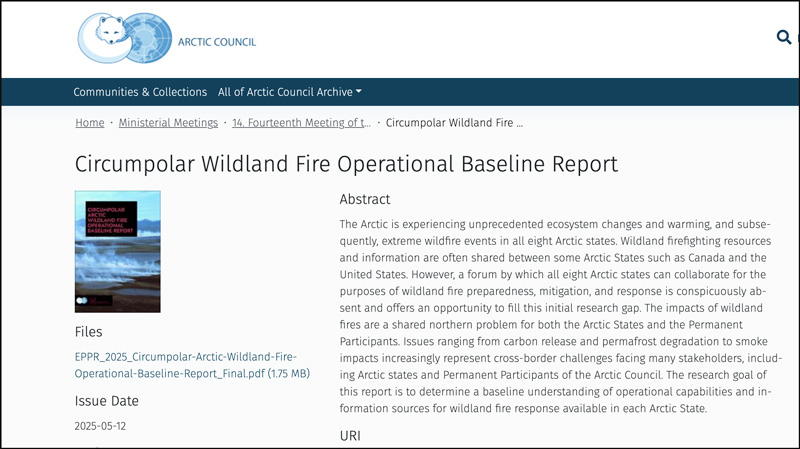Arctic Council - EPPR Working Group - Arctic Wildland Fire Project
Project
Wildland fires are increasing in frequency, severity, and area across the Arctic, bringing challenges as well as opportunities and requiring greater collaboration, knowledge sharing, and partnership. Gwich'in Council International (GCI) is leading two projects to advance work on wildland fires at the Arctic Council, in the CAFF and EPPR Working Groups. Additionally, there is work in other Arctic Council Working Groups (AMAP and ACAP), as well as efforts in the Expert Group on Black Carbon and Methane related to understanding wildland fires
Each project has unique objectives and intended uses, as well as its own Steering Committee of State, Permanent Participant, and Observer representatives. The projects are connected through their overarching goal of addressing wildland fires in the Arctic and circumpolar focus. Knowledge sharing is a key component of both projects, and a workshop is planned (2022) to bring people working in ecology, management, and response together and review draft project deliverables.
The Center for Arctic Security and Resilience (CASR) is proud to have a proposal selected in support of the collective team for a research report involving a comprehensive baseline assessment and understanding of the Circumpolar North operational circumstances involving Arctic wildland fire operational responsibilities.
Project Team (involving the CASR team):
Mr. Edward Alexander - founding project member - Arctic Council permanent participant co-chair and Head of Delegation of Gwich'in Council International
Mr. Michael Young - U.S. State Department lead and main facilitator of both working groups efforts
Ms. Devlin Fernandes - founding project member - Executive Director of the Gwich'in Council International (Arctic Council Permanent Participant)
Dr. Troy Bouffard - report co-author, Director of CASR
Colonel Edward Soto - report co-author, United States wildland fire operational expert
Overview
The research goal of this report is to determine a baseline understanding of operational capabilities for wildland fire response available in each Arctic State. Toward this objective, each Arctic State will be surveyed for relevant governance information in order to ascertain the following fundamental operational components, including:
- The role of civil and/or military entities: Who takes the lead and what authorities define leading and supporting roles.
- Domestic response systems [authorities, jurisdictions, processes]: Explores the hierarchical relationships between and within responding agencies.
- Operational sources of wildland fire information: Information providing weather, resources readiness, and risk assessment leading to the decision making process
- Primary resource and logistical support to operations: Systems and resourcing of people and equipment between geo-political divisions as incidents grow.
Publications
- Operational Baseline Report (Arctic Council, May 2025)
- Circumpolar Capabilities - Article (Wildland Fire Magazine, May 2025)
Supporting Event(S)::
- “Arctic Wildland Fire and Mitigation: Understanding, Implementation, and Future Directions”, Arctic Council - EPPR Working Group, Nord University, Bodø, Norway, Program Link and YouTube Link
- From 17-18 November, 2021, the Arctic Wildland Fire Sharing Circle brought together diverse voices to share projects, tools and research to start new conversations and build networks to tackle Arctic wildland fires. Please use the following link the view the keynote remarks from the the founding project member, Mr. Edward Alexander.
associated project links:
- Arctic Council: https://www.arctic-council.org/projects/circumpolar-wildland-fire/
- Gwich'in Council International: https://gwichincouncil.com/wildland-fire
- EPPR Working Group: https://eppr.org/projects/circumpolar-wildland-fire-project/




